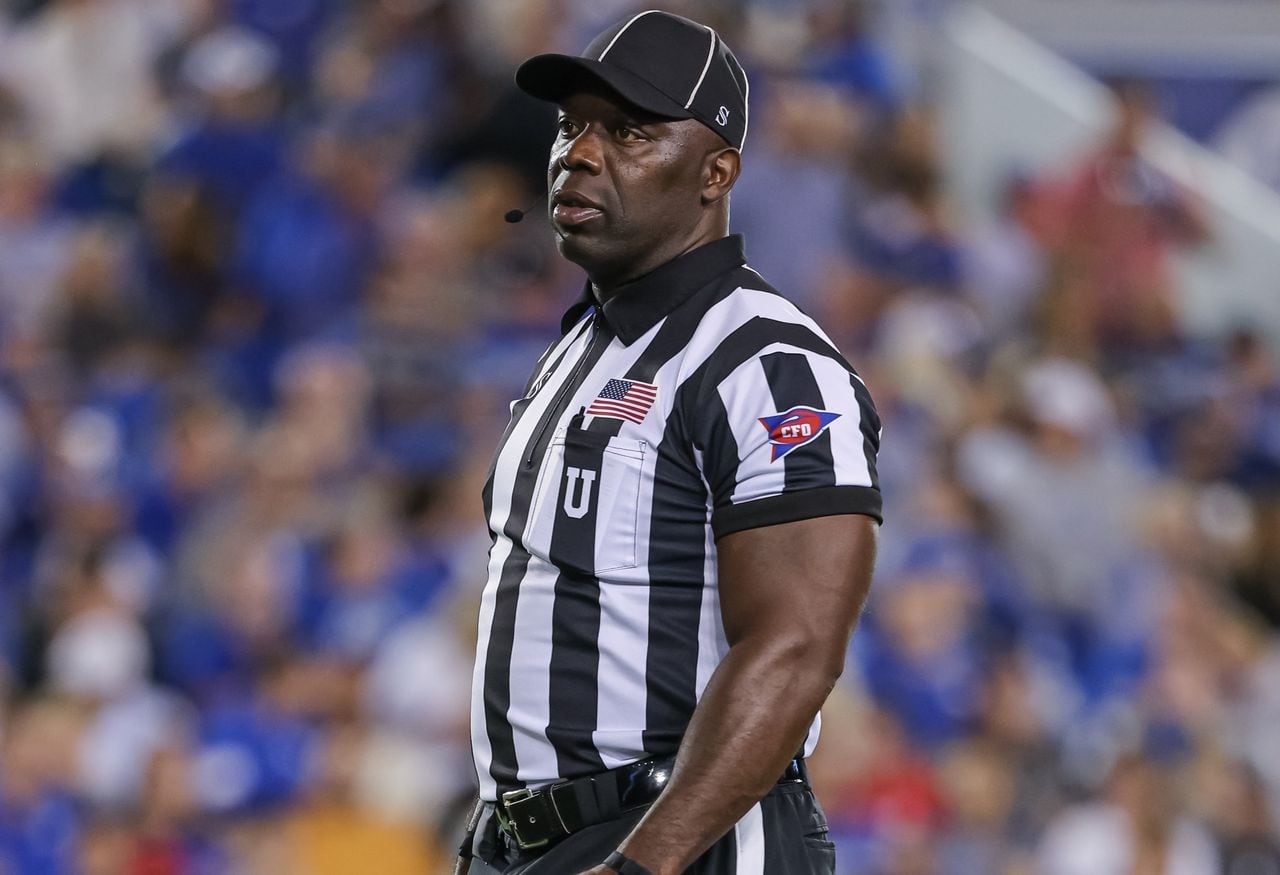The story of the Kick Six, as told by the officials
As Alabama lined up to attempt a 57-yard field goal with one second remaining in the 2013 Iron Bowl at Jordan-Hare Stadium, back judge Steve Patrick noticed Auburn return man Chris Davis standing alone in the end zone just in front of the goal posts.
Patrick and Davis both grew up in the Birmingham area and became friendly during Davis’ career with the Tigers. Patrick — who played quarterback at Jacksonville State in the 1980s — said he tried to cultivate a working relationship with at least one player on every SEC team, so that he would have someone to turn to if things got heated during a particular game.
“I just kind of eased up to him and said, ‘Hey, what are you gonna do with this thing?,” Patrick recalled, meaning if the field goal attempt was short. “He said, ‘I’m gonna catch it and run. That’s all I can do.’”
Davis did, of course, catching Adam Griffith’s short kick and running more than 100 yards for a touchdown, a 34-28 Auburn victory and a permanent place in Iron Bowl lore. The play has been immortalized as the “Kick Six,” which celebrates its 10th anniversary this year.
As part of a nine-part project examining the game, the play and the legacy of the Kick Six from numerous angles, AL.com spoke with five of the seven on-field officials who worked the 2013 Iron Bowl. Their perspective as impartial observers is perhaps a unique one and includes several never-before-told anecdotes about one of college football’s most fantastic finishes.
Here is the oral history of the Kick Six, as told by the men wearing the black and white stripes that night. (Some quotations have been edited for clarity and condensed for length).
The officials
• Matt Austin, referee — retired; now works as college football rules analyst for ESPN and SEC Network
• Rodney Lawary, umpire — still an active on-field official for the SEC
• Bobby Moreau, side judge — retired from officiating; works as an educator in South Carolina
• Steve Patrick, back judge — retired after working as both SEC and NFL official; runs a graduation supply company in Alabama
• Blake Parks, field judge — currently works as replay official for the SEC
• Tim Sistrunk, head linesman — retired from officiating and now working in sales in Louisiana; was traveling out of the country and was not available for an interview
• Mike Taylor, line judge — still an active SEC official; declined to be interviewed for this story
Umpire Rodney Lawary is shown during the 2022 Kentucky-Northern Illinois game in Lexington, Ky. Lawary was the umpire in the 2013 Iron Bowl, which ended in the “Kick Six.” (Photo by Michael Hickey/Getty Images)Getty Images
‘Something is in the air tonight’
Alabama entered the 2013 Iron Bowl with an 11-0 record and ranked No. 1 in the country, playing for a shot at a third straight BCS national championship.
Auburn was 10-1 and ranked No. 4 nationally, with its only loss 35-21 at LSU in late September. Gus Malzahn’s Tigers were a 10-point underdog despite playing at home, having beaten Georgia 43-38 on the “Prayer at Jordan-Hare” two weeks prior.
Steve Patrick, back judge
It was a great honor. We had a great crew. We were made for games like that, with Matt Austin leading us and a great group of guys that had been in the conference for a lot of years. So we knew how to work a game like that, the aspect of, it’s a big one. Let’s get out of the way and let the kids settle it on the field. And it being the Iron Bowl, it’s just a special game that anybody that’s never been a part of it, they may not understand it.”
Rodney Lawary, umpire
“We have to be at the game site two hours before game time and that’s usually no problem. We can usually drive straight up through campus and get to the locker room. But this time, man, we pulled up on campus and then it took another 30 minutes to get to the locker room because there were so many people there. I was like ‘man, is this the second coming?’ It was amazing. Something is in the air tonight.”
Bobby Moreau, side judge
“The game was back and forth, back and forth. You focus on the game, and if a big play comes your way, so much the better. But we knew it was going to come down to the last play of the game.”
Matt Austin, referee
“Even before the Kick Six, it was an incredible game. That just made it the all-timer.”
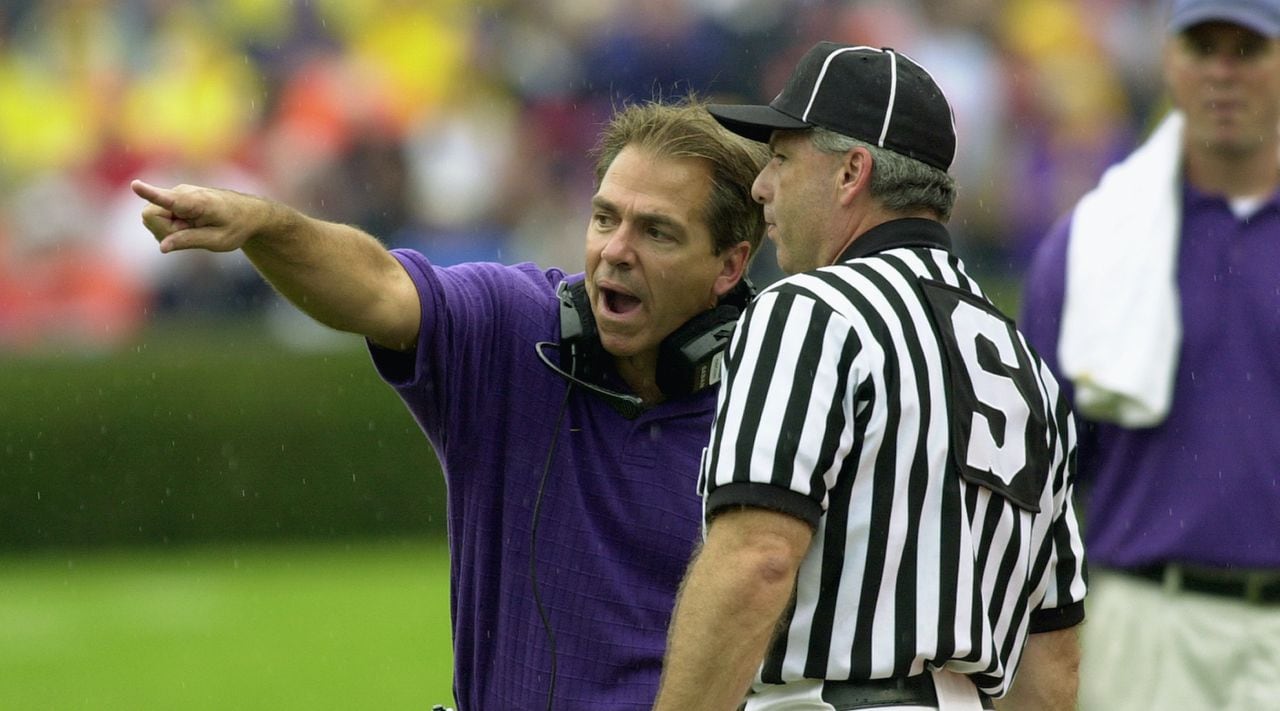
SEC official Blake Parks is shown with then-LSU coach Nick Saban during a 2002 game vs. Auburn. Parks was the field judge in the 2013 Iron Bowl, the game famous for the “Kick Six.” (Photo by Erik S. Lesser/Getty Images)Getty Images
‘There was one second and he wanted it’
Alabama jumped out to a 21-7 lead in the second quarter, but Auburn scored two straight touchdowns to tie the game early in the third. Then came an amazing play that has been largely forgotten, AJ McCarron’s 99-yard touchdown pass to Amari Cooper to give the Crimson Tide a 28-21 lead with 10:28 to play.
Auburn battled back to tie the game again with 32 seconds left on Nick Marshall’s 39-yard touchdown pass to Sammie Coates. Alabama had just enough time to perhaps get into range for a Hail Mary attempt, or possibly a long field goal.
With time running out, McCarron threw a short pass to T.J. Yeldon in the left flat, and Yeldon ran out of bounds at the Auburn 40-yard line as time expired. Saban, however, lobbied with the officials to use the replay system and see if — as he believed — Yeldon actually left the field with one second remaining.
Bobby Moreau
“The head linesman, Tim Sistrunk, and I both had ruled him out and the clock expired. Coach Saban (argued that) the clock should have had one second. Where we had it, his foot touched the ground, I mean, there must have been like 99/100th of a second left. But obviously you put it back on.”
Matt Austin
“We had a couple of reviews during that game that I felt were wrongly overturned. Thank goodness each team scored the next play. We took two touchdowns off the board, which I thought they were both should have been touchdowns looking at the Jumbotron while under the headset. So I was a little concerned about putting the one second back on the clock. Once I saw the replays started, yes, there should have been a second on the clock. So no issue, we got it right.”
Blake Parks
“On that particular play, they probably wouldn’t have done anything except for Saban was pressing and pressing and pressing the issue, which meant that he was probably eventually going to challenge that clock. We’ve got a ball out of bounds or not out of bounds at one second left. Let’s just go to overtime and everybody would be fine with that. But he wasn’t going to have it because whatever was going on in his mind, he knew that there was one second and he wanted it.”
Matt Austin
“Coach Saban, he wanted the second, he was lobbying for the second. I assured him that replay would take a look at it and we would certainly do the right thing. I think we did. And then, look what happened.”
Blake Parks
“I’m the one that had to tell Coach Malzahn that we were going to put that second back up. He looked right through me. He really just didn’t have any reaction to it. We talked about it later and he goes, ‘I just couldn’t believe it.’”
Bobby Moreau
“I think in retrospect, Alabama probably wished he was out, but it’s one of those things we’ll never know now.”
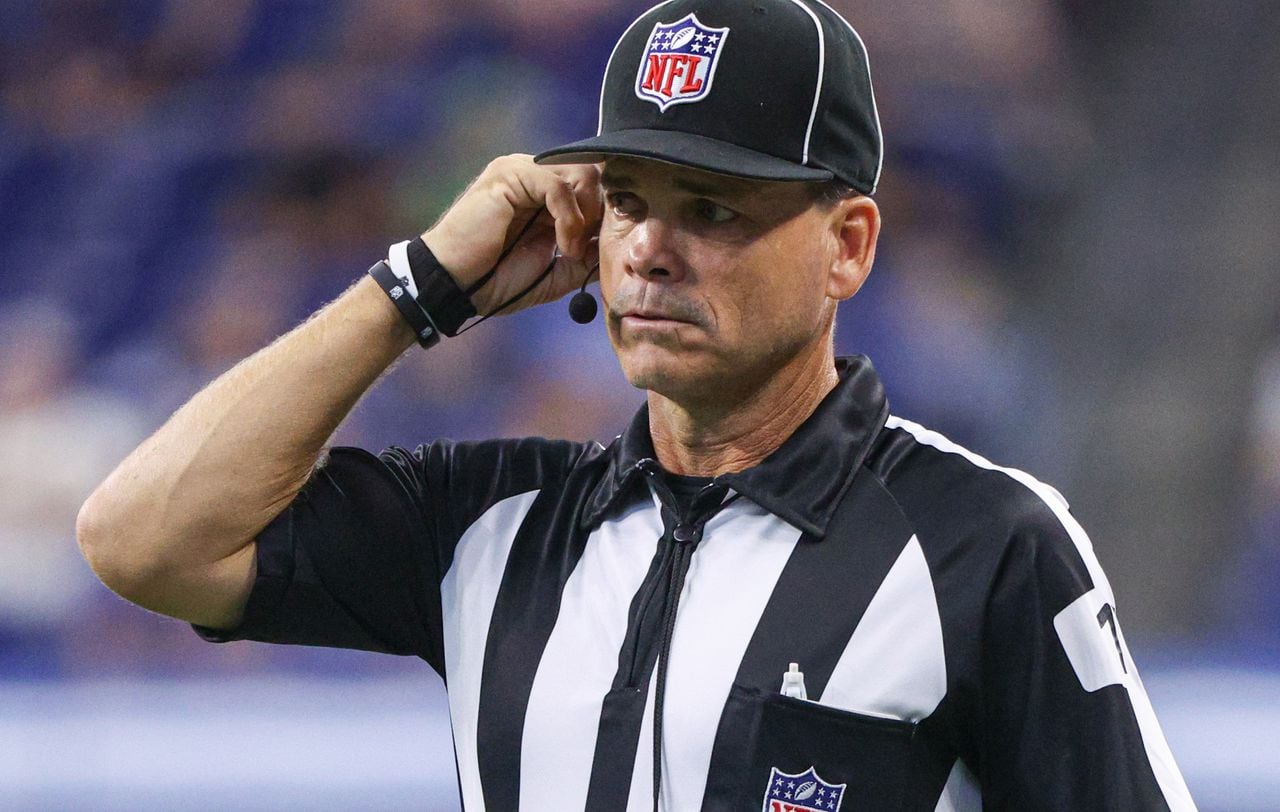
NFL official Steve Patrick is shown during a 2022 game between the Indianapolis Colts and Detroit Lions in Indianapolis. Patrick was the back judge for the 2013 Iron Bowl, the game famous for the “Kick Six.” (Photo by Michael Hickey/Getty Images)Getty Images
‘If they jump up and swat this ball, we’ve got issues’
Alabama got its second back via replay, and sent out its field goal unit for an extra-long try. However, starting kicker Cade Foster had missed three field goals already in the game, so he wasn’t given the opportunity for a fourth.
Instead, Saban sent out Griffith, a redshirt freshman who had attempted only two field goals that season, none as long as 40 yards. And because Griffith was the back-up kicker, second-team holder Cody Mandell — normally the Crimson Tide’s punter — came along with him rather than McCarron, the regular holder.
Austin positioned himself off to the kicker’s left, with potential fouls for roughing the kicker or holder among his responsibilities. Lawary and Moreau lined up directly behind the defense, positioned to check for “leaping,” holding or any sort of personal foul within the line-of-scrimmage scrum.
Taylor was on the line of scrimmage along the Auburn sideline, with Sistrunk opposite him on the Alabama side. Their responsibilities included checking for offsides, and also assisting in case of any post-kick penalties at the line of scrimmage.
Patrick and Parks were standing underneath the goal posts, tasked with determining whether or not the kick was good. Parks was under the upright closest to the Auburn bench; Patrick was on the Alabama side.
Auburn sent out its field goal defense unit, but unbeknownst to most everyone watching, dropped a man back into the end zone. However, it originally wasn’t the player everyone remembers.
Steve Patrick
“Ryan Smith went back there in the end zone. Ryan went to Cordova High School and was a state champion high-jumper, which ran up my red flag immediately. As soon as they called timeout, the conversation me and Blake Parks had was ‘if they jump up and swat this ball, we’ve got issues.’ Because that’s illegal batting, you can’t bat the ball in the end zone in any direction. Me and him are kidding that if we have to drop a flag, go to the tunnel and use our O-to-Os (official-to-official headset communicators) to let Matt know what we’ve got, because we ain’t getting out of the stadium. If we have a safety on Auburn that ends the game, we’re in trouble.”
Blake Parks
“During this time out, Steve Patrick and I, we’re back there talking about all the possible things that could happen on this play. We talked about what would happen if the ball hit the end zone, if it was touched and went in the end zone, if it went out of bounds, if it was blocked. We even talked about it, if a guy leaps over the crossbar, he can’t block the field goal, all this stuff. But never ever did we talk about somebody’s gonna be back here returning this field goal. It just never was one of the options. It just never entered our minds.”
The Tigers called a timeout, to ice the kicker. They then made a switch with their deep man.
Steve Patrick
“Chris Davis came back out after the timeout. He was kind of my go-to on the defensive side of the ball. If there was ever any issues on the defensive side of the ball, I had one guy I could go to and help us get it back in control. So I just kind of eased up to him and said, ‘Hey, what are you gonna do with this thing?’ He said, ‘I’m gonna catch it and run. That’s all I can do.’ I just said ‘good answer’ and went back.”
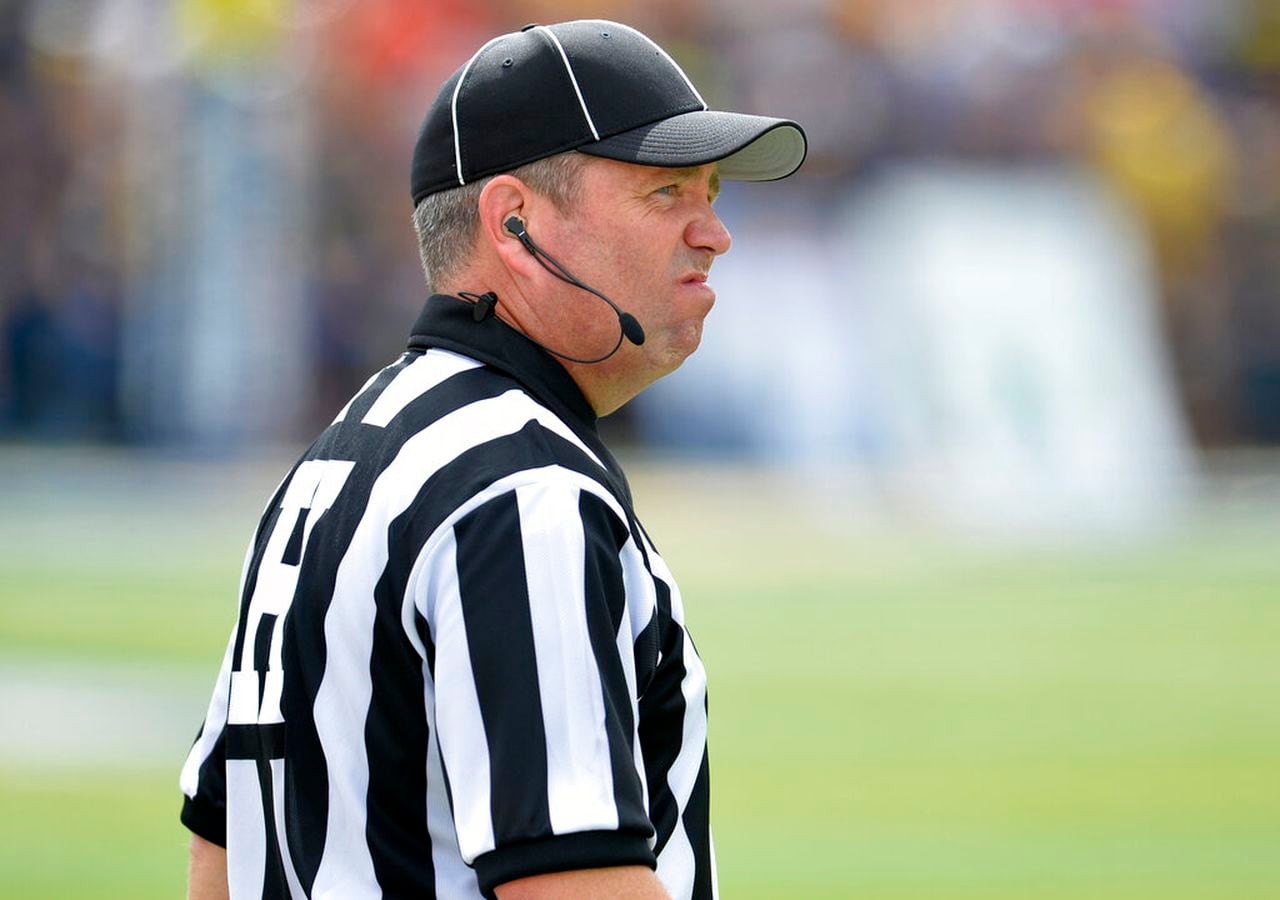
SEC official Tim Sistrunk is shown during the 2014 Missouri-Toledo game in Toledo, Ohio. Sistrunk was the head linesman in the 2013 Iron Bowl, the game famous for the “Kick Six.” (AP Photo/David Richard)AP
‘Nobody on the field was going to catch him’
Griffith got the kick off with no difficulty, but it was well short and off to the right. Davis caught the ball just outside the goal post on the Auburn side of the field, his right foot just a few feet from the end line.
The Auburn return man headed up the field, cutting to his left around the 5-yard line. He evaded a lunging tackle attempt by Alabama tight end Brian Vogler at the 20, then hit the sideline.
After Mandell failed to knock him out of bounds at around the Auburn 44, Davis was in the clear. After that, the touchdown — and the Auburn victory — became inevitable.
Steve Patrick
“When it came off his foot, you could kind of tell it was going to be a little bit short. I just remember coming out from behind the goal posts and when I got maybe to the 5- or 10-yard line, I looked up and saw that wall set. I was just like ‘Holy cow, he’s got a chance.’”
Blake Parks
“I couldn’t tell that it was going to be short, but I could tell pretty early on that the kick was going to be wide. So when he catches this ball nine yards deep, I literally am the only guy in the stadium that could make this tackle. He’s one step in front of me when he catches this ball. It’s kind of an ‘old man’ moment, but by the time he got out to the 5- or 10-yard line from my view behind him, I could tell that nobody on the field was going to catch him because he was taking 2-3 steps to everybody’s one.”
Bobby Moreau
“We’re probably going into overtime, never thinking anything about the return. So the ball is snapped and Rodney Lawary, who’s the umpire, we step up, do our duties. And then all of a sudden, we turn around and it’s short. Chris Davis has got the ball and he’s returning. So I’m thinking, ‘Oh my gosh, he’s going to return this.’ And now we’re looking for illegal blocks, behind-the-back blocks.”
Blake Parks
“I’m just trying to help out, looking for illegal blocks and out of bounds and all that kind of stuff. I started inside at the post, so I’m just looking for things in front of him. And of course they’re running way faster than an old man like me. We’re rolling him over to the next group of officials, the next wave, if you will. And it’s just kind of ‘take a seat and watch it happen’ after that.”
Steve Patrick
“To be honest with you, when it gets that deep in the run and that deep into the game, it’s got to be an egregious foul. It’s got to jump out where everybody in the stadium sees it, nothing ticky-tack. If it affects the play, we’ve got to call it no matter how big or how small it is. I’m not even looking 30 yards away, I’m focused in on an area where it could have an effect on the play. I’m focused on that wall that Auburn has set up, and then once it cleared the wall, we’re letting the kids settle the game.”
Rodney Lawary
“I never get to look back during kicks because we have two guys under the goal post. They’ll tell us ‘good or not good.’ So I have to fight that urge. So he kicks the ball and I hear ‘oh, it’s short’ and you hear the crowd reactions. I turn around and my first thought is ‘no low blocking and watch for blocks in the back.’ I find Auburn players because they’re the return team now and I’m just processing. I see one good block, I say, ‘oh, that’s legal.’ Another good block, ‘that’s legal,’ another good block, ‘that’s legal.’ And the closer he got down to me and to the end zone, the crowd got louder and louder and louder and louder.”
Bobby Moreau
“Next thing you know, he passes us and there’s nobody back there but the referee.”
Matt Austin
“I had a 50-yard headstart. Back when I was younger, I prided myself on never getting beat to the goal line, not on a change of possession or a kick return. But in that case, you just start flowing as all the players started to react to the return. Now the linemen are starting to move to that direction. Now I have to get back to keep my perspective and stay deeper, and I just kept drifting and drifting. Once I saw him break free down the sideline, luckily I had that head start because I don’t outrun any 18- or 19-year-old kids anymore.”
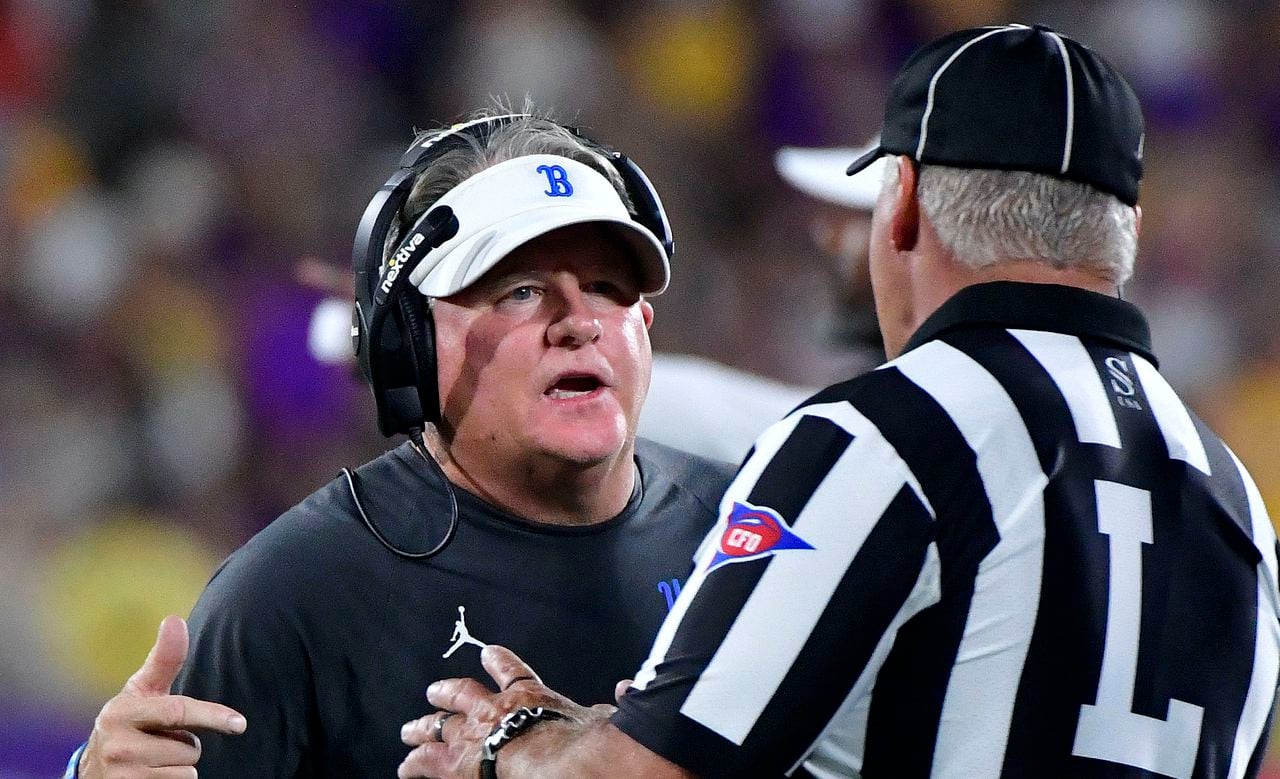
SEC football official Michael Taylor is shown with UCLA coach Chip Kelly during a 2021 game vs. LSU. Taylor was the line judge in the 2013 Iron Bowl, the game famous for the “Kick Six.” (Photo by Will Lester/MediaNews Group/Inland Valley Daily Bulletin via Getty Images)MediaNews Group via Getty Images
‘He’s still mad at the deep guys’
Once Davis crossed the goal line and Austin was assured by his fellow officials that there were no flags on the play, he signaled touchdown. The only remaining drama was whether or not Davis had stepped out of bounds at some point.
Complicating matters was that Taylor, the line judge, had run toward the line-of-scrimmage scrum as the ball was kicked, as proper mechanics dictated that he do. Thus, he was out of position to make a call if Davis had stepped out of bounds, though it wasn’t necessarily his fault.
Any out-of-bounds call would have to be verified via instant replay. Though by that time, Auburn fans had already started streaming onto the field to celebrate.
Matt Austin
“We have two guys back under the upright, the field judge and the back judge. And at the time, we had the crew communication where we could talk to each other. And to this day, the line judge will tell you that nothing was ever said over the headset about there being a return man back there. So the normal mechanics on a field goal or extra point is after the ball is kicked, the line-of-scrimmage guys (line judge and head linesman) pinch in. You’ve got 18 guys that are all together and you want to make sure you have enough officiating bodies there to stop any extracurricular things that may happen. So he took his normal mechanic and he came into the field to make sure nothing was happening. Lo and behold, now he hears the crowd roar like everybody and realizes we’ve got a return. … He’s still mad at the deep guys for not saying, ‘Hey, we’ve got a returner back here. Let’s be aware.’ I’m sure nowadays everybody does that.”
Blake Parks
“We had never seen it before so you really can’t criticize the fact that we didn’t see that coming, but it’s a learning experience. It would have never happened again without us thinking about it, but I thought we handled it really well. We might have should have yelled (over the O-to-Os) when his return started up the field, to warn the rest of the crew that we’ve got a return because everybody’s got their own responsibilities and no one’s really expecting this.”
Steve Patrick
“Hindsight’s always 20/20, but I wish I would have let Mike Taylor know that ‘hey, we might have a return on this thing’ so they could get the traffic out of the way coming up the sideline. We felt good sitting in the tunnel waiting on the replay to watch it. We felt good that he did not step out of bounds. We had the best over there on that sideline and Mike Taylor, nothing was going to get past him on that sideline.”
Matt Austin
“The mechanic is any time you get a long touchdown run, you always look for the sideline official. Is he going to call him out of bounds? Because I don’t want to signal the touchdown if he’s gonna come up waving his hands saying ‘no, he’s out of bounds.’ I was waiting for any kind of confirmation. Then I could see him just running down the field, not even on the sideline. We have instant replay, so I really had no other choice than to go up with the touchdown (signal).”
Bobby Moreau
“Mechanics-wise, we may have been off a little bit, but looking for what we needed to look for, it was pretty clean.”
Matt Austin
“(Taylor) unfortunately got out of position because he didn’t realize there was a return. By the time he realized there was a return coming his way, there was nothing he could do. And that’s something that we obviously cleaned up after that play and it would never ever happen again to us. I hope now that everybody can look and say, ‘hey, if I got a long field goal, let’s make sure that we don’t pinch in until we know there’s not a return.’ So I think we all learned from it. But again, thank goodness we had replay to verify that he didn’t step out of bounds.”
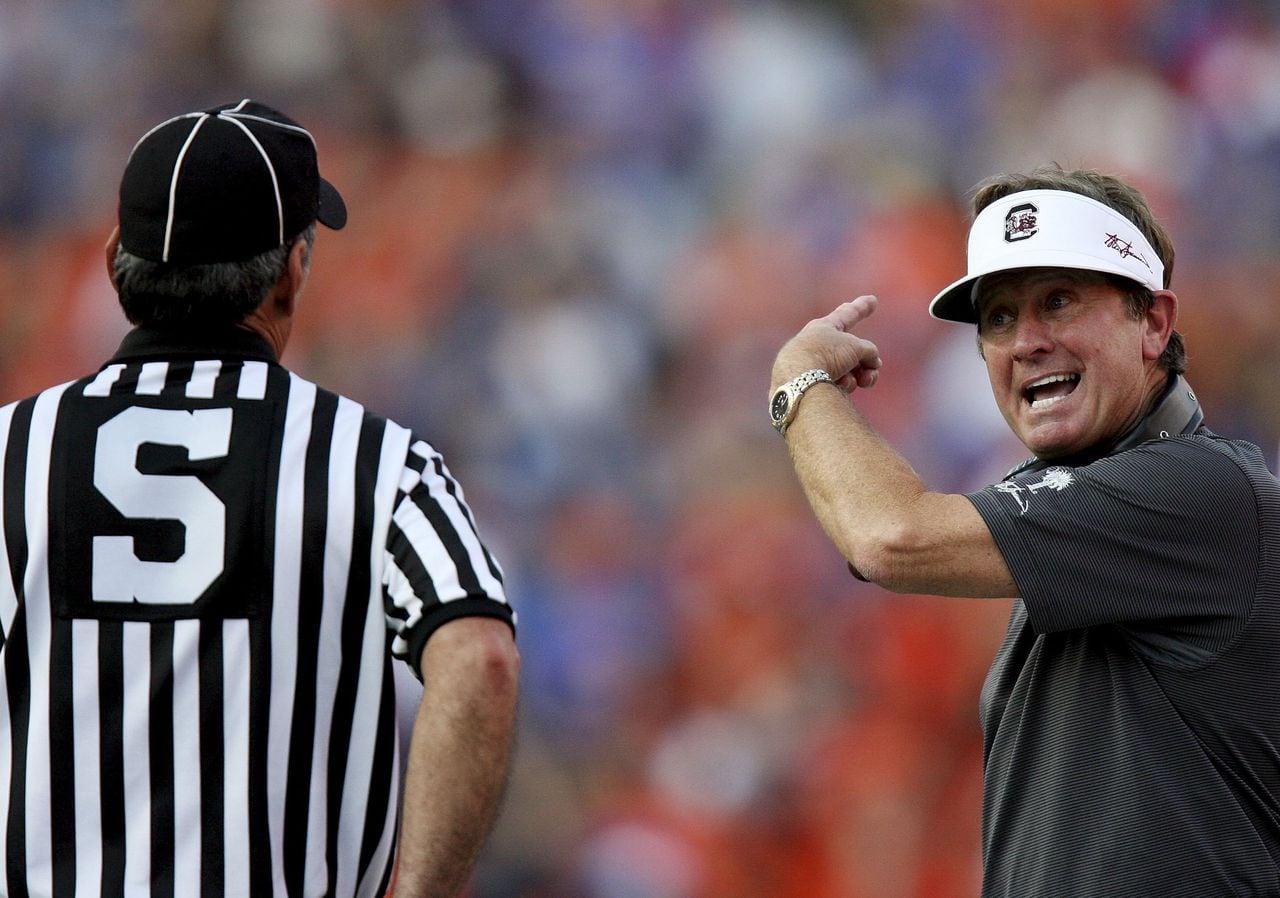
SEC official Bobby Moreau is shown with South Carolina coach Steve Spurrier in 2006. Moreau was the side judge in the 2013 Iron Bowl, the game famous for “The Kick Six.” (Photo by Doug Benc/Getty Images) Getty Images
‘We’ve gotta get the hell out of here’
Austin quickly got confirmation that Davis had stayed in-bounds and that the touchdown counted, the game was over and Auburn had won. With thousands of jubilant Tigers fans rushing the field from every direction, he and his fellow officials had to get out of the way.
Many of the officials were able to quickly navigate their way to the tunnel where their shuttle van was waiting. Austin and Lawary, however, were on the opposite goal line, and thus had to work their way more than 100 yards through the throng of celebrants.
Matt Austin
“That was probably the worst part of the whole play, was trying to get off the field afterwards. I wasn’t concerned that somebody was going to come after me or there was going to be fan involvement that way. At that point, the game is over, so our job is to get out of there. I hate to say this this way, but the players, they’re kind of on their own. … Alabama, to their credit, they pretty much just went to their sideline and got off the field.”
Blake Parks
“We’re whisked off the field every week in the Southeastern Conference for security. But on this particular night, our van was (parked) against the grain. So where all those people poured off that end zone wall behind the post is where we had to get to our van. I was out in the middle of that cattle call, if you will. And a security officer found me, grabbed me by my back belt loop and just started aiming me towards the corner of that end zone. So we’re bowling over people, just as fast as we can. They’re getting stampeded with people coming the other way.”
Steve Patrick
“It was kind of pandemonium after the touchdown. My hat will always go off to the security guys. They put a circle around us to get us to the tunnel. It didn’t matter who you were, if you tried to break that circle, you got run over by some really great security guys, because they protected us all the way to that tunnel.”
Bobby Moreau
“We’re still in shock. I take off running and then, all of a sudden, this little girl gets run over. I mean, she’s got blood on her face. I reached down to try to help her up and then one of the security people grabs me and says ‘come on, we’ve gotta get the hell out of here.’ I didn’t realize it until you saw this mass of people running toward you, how big of an impact this was and how you’re always going to be a part of that.”
Rodney Lawary
“The officiating crew ran off the field, but Matt and I, we have to wait so our replay guys can clear the score. So we’re waiting around, waiting around. As we’re waiting around for replay to clear the score, the field is filling up with fans. He finally said ‘you’re clear.’ And now me and Matt, we’re trapped out there. We’ve got to maneuver through these fans.”
Matt Austin
“Since I did go to replay, it slowed me down about 30 seconds or so, by the time I was able to leave. Our alternate (official) who was on the sideline, who was right there with me at the time, we were running off the field together, but we kind of lost our escort to lead us through the crowd. I had to go completely 100 yards down the other end of the field. It couldn’t have been worse in that regard.”
Blake Parks
“Now we all got to the van and we started getting a head count so they could get us out of there and they couldn’t find Matt. I remember security saying in the van, ‘well, they’re probably gonna strip him for souvenirs.’ The guy was thinking they’re gonna get Matt’s hat, his whistle, his flag or whatever else they can get their hands on before they get him off the field. But once he finally got there, we got on out because nobody left at that point in time. It was easy because everybody was still in the stadium.”
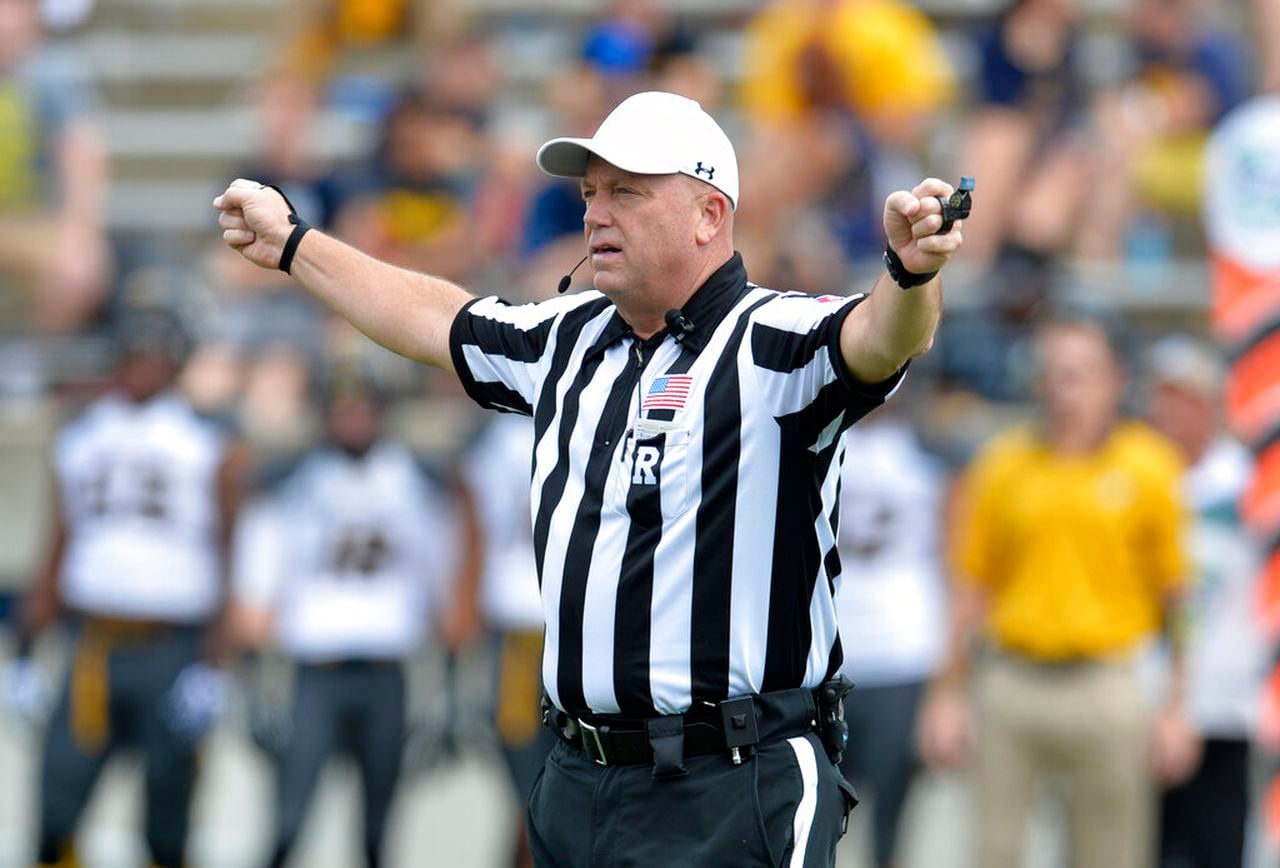
Referee Matt Austin is shown during the 2014 Missouri-Toledo game in Toledo, Ohio. Austin was the referee in the 2013 Iron Bowl, the game famous for the “Kick Six.” (AP Photo/David Richard)AP
‘That’s my claim to fame right there’
Once they got back to their hotel, the Iron Bowl officiating crew did its regular de-briefing, discussing any questionable calls or anything they might have done better. Austin noted that Auburn’s game-tying touchdown late in the fourth quarter was borderline as to whether or not the Tigers had an illegal man downfield on the play.
Beyond that, however, the officials are satisfied they called a clean game. And as the years have passed, they take pride in having been involved in one of college football’s most-memorable games and arguably its all-time, most-incredible finish.
Bobby Moreau
“On the way to the hotel, we didn’t say a whole lot. Usually, we’re conversing. But there was none of that until we got back and got together in the post-game and watched the video and everything else. It was exciting. And I was just blessed to be part of that and will forever be linked in one way or another to it.”
Blake Parks
“I think the game, not only the play, but the game was really officiated well. The game was a classic from kick to kick, but I also feel like it was officiated very well.”
Matt Austin
“It’s an honor to be involved in a play like that because they don’t happen very often. The Kick Six, it will go down as the greatest play ever in college football history, especially for Auburn fans. I wish I could say I did something to create that wonderful play, but I was pretty much just a spectator like everybody else.”
Blake Parks
“Everywhere I go to talk, people always ask about this game. It’s one of the all-time games. You can put it up there with the Cal-Stanford return and the Flutie Hail Mary. Those are probably the three craziest finishes in college football history. And the fact that it’s Alabama-Auburn just kind of makes it rise to another level of importance with them.”
Steve Patrick
“There’s not another game that sticks out in my mind like the Iron Bowl and the Kick Six. Shoot, I’ll go down talking about that one. And I think history will show that it will probably be the No. 1 most exciting play or finish in NCAA history. That one had such a dynamic impact on that year’s football season.”
Rodney Lawary
“People that engage me in conversation about football, I tell them ‘I already know, I don’t care if it’s the national championship game, the Rose Bowl or whatever, I would never, ever do a game with as exciting an ending as that one.’ I was in the seven-overtime game with LSU and Texas A&M (in 2018), but nothing can compare. Nothing had the adrenaline and the hair sticking up on your skin as that game. That’s my claim to fame right there. Nothing will top that.”
Bobby Moreau
“It becomes a memorable experience for everybody involved. It was the second miracle down in Auburn that year, obviously after the Georgia game a couple of weeks before. It’s one of those things that people will talk about and I’ll tell them ‘I was in the Kick Six game. I was there.’”
Creg Stephenson has worked for AL.com since 2010 and has covered college football for a variety of publications since 1994. Contact him at [email protected] or follow him on Twitter at @CregStephenson.
